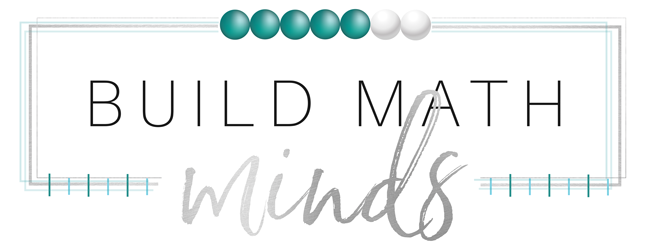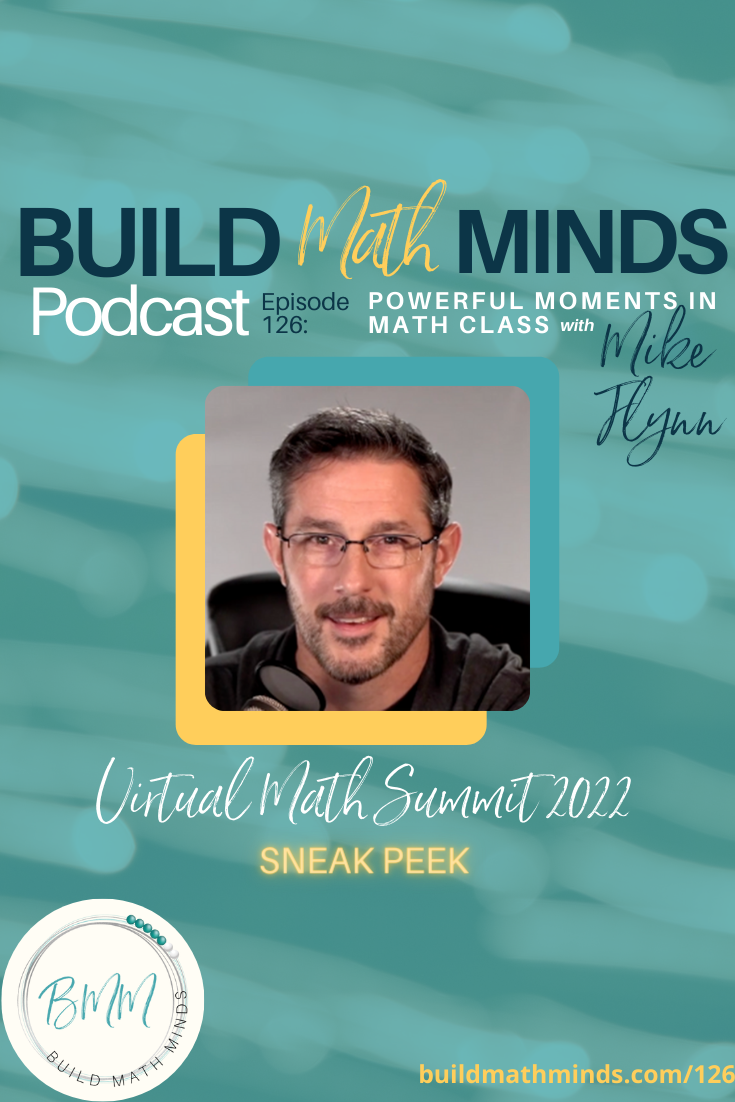Resources mentioned in this episode:
Dan & Chip Heath’s book The Power of Moments: Why Certain Experiences Have Extraordinary Impact
Welcome fellow Recovering Traditionalists to Episode 126. Today we are looking at Powerful Moments in Math Class with Mike Flynn.
It has been so fun listening to all 31 of the Virtual Math Summit sessions for this year and I can’t wait for educators all over the world to watch them as well. The summit is completely free for educators to attend.
If you want longer access to watch the sessions, and more interaction with some of the presenters, you can do one of the paid levels of the summit. We have a VIP level that is $19.95 and gives you 30 days to watch this year’s sessions plus you get to attend the live Implementation sessions we are doing with some of the speakers throughout the month of March.
The other option is to become a member of the Build Math Minds PD site for $39/month. This gives you access to this year’s summit sessions for as long as you are a member and you can attend the live Implementation sessions just like the VIP. But as a member you get access to all the past 5 years of Virtual Math Summits, plus the hundreds of other PD training sessions we have on the site.
Just go to VirtualMathSummit.com/register to see the options and get registered.
Before the sessions get released, I want to give you some sneak peeks at them. This week’s sneak peek comes from one of Mike Flynn’s sessions. Mike is doing a mini session (those are under 30 minutes) about engaging students in deliberate practice, but I wanted to share a sneak peek at his full session titled, Powerful Moments in Math Class: Why Certain Experiences Stand Out and How to Create More of Them.
Mike: “So Chip & Dan Heath, they talk about moments of Elevation as ‘Defining moments that rise above the everyday. They provoke not just transient happiness, but memorable delight.’ And the psychology they reference that really gets at this idea of moments of elevation is the phenomenon known as the Peak End Rule. Which describes how humans judge experiences. That we go through life, we have all kinds of experiences and within an experience, there are positive moments in there and negative moments. So we can consider the positive experiences as Peaks, a peak moment. And the negative experience, we can think of it as a Pit experience. So we’ve got these holes and these big mountains in anything that we do.
And they also talk about how the end part of the Peak End Rule are the transitions: the beginnings and the ends of events. So the beginnings and the ends of events are when people tend to remember more of that because there’s all the eager anticipation at the start of something, there’s sort of the culmination and the feelings that go around completing something. And so, beginnings and ends are really important for our memory. And as well as the intensity of an experience.
Now what’s interesting with the intensity is that depending on whether the high intense moment is a Peak experience or a Pit experience will define sorta how we view the whole experience as a whole.
So for example, imagine a friend invites you to a restaurant and they say ‘It’s the best restaurant! You gotta check it out!’ and you go there and there’s a huge line to get in. You’re waiting for a half hour just to even get in there to order. You might actually think of that line experience as a negative experience during this restaurant trip, right? Then you get up to the counter and the owner is just awful. Just rude, throwing people out of line for not ordering correctly, and just super intense and so you might also say that that experience in your Soup Day was a negative one. But then you get your soup and go outside and you take a bite of it and it is so good you have to sit down just to process the flavors that are going on in your mouth. And you realize, like, that might be a really high positive experience cause that was just the best soup you’ve ever had.
Well, when you think of the Peak End Rule, we judge our experiences based on how we’re feeling at the most intense elements. So even though we had a couple of Pit experiences here, the Peakiness, if you will, of the soup, the taste of the soup, was so high that if a few weeks later your friends are like ‘Hey you wanna go back to that restaurant?’ you are more likely to say “Yay!” because you’re gonna remember that favorably because the intense feelings were positive in that case. Um, if it was the other way around, you wouldn’t go. It’s a negative experience.
So, the Peak End Rule’s really important because as teachers every lesson has the potential to sorta go in these different directions. So consider right now if you would’ve asked students. If you just interviewed a random student in the country and asked them to sorta think of their last math class and have them sort of sketch out, kinda like we did with the restaurant there, the ups and downs. We might have some positive experiences or negative experiences. What do you think their line would look like, to sorta describe how their math class went? And if you’re like most people this is what I tend to see when I ask people this: is it’s sorta flat with some dips here and there, not a lot of peaks.
And we also think about the Peak End Rule, how do many math classes begin? Like sometimes you’ll see like there’s an instant ‘do now’ or there’s like a ‘homework review’ right when you come in. And so we think about, like, the memorable parts of the beginnings of something that it might just be something that is just homework review and we aren’t necessarily capitalizing on that really precious few moments when you’ve got a really ripe audience ready for like anything.
The same is at the end. It might be homework being assigned at the end of class. So the ends of this may not actually be jiving with that and we don’t have a lot of Peak moments built in here. Doesn’t mean every math class is like that, but this can be problematic. So if kids are experiencing nothing really fun in the beginning, nothing really fun at the end, and then there’s like tests, quizzes, worksheets, and lecture and things, that Math class may not be one of the most memorable experiences. But we can go ahead and tap into understanding how to build Peak moments and start to think about how we add some bumps in there.
How do we start to raise Peaks? And that could be like an engaging routine we want to try. Could be like a nice Open Middle Task, or a 3 Act Math Task, or something. These things create some positive, memorable experiences. These Peaks are moments of elevation. So the way Chip & Dan Heath describe it is they say, sort of, our job is to fill Pits. We can’t necessarily always eliminate them, we do need to do tests & quizzes on occasion but we can make them more positive, maybe much less of a Pit experience. And we can build more Peak moments.”
When I listened to that part about the intense moments being what we tend to remember, the thing that instantly came to mind was childbirth. I’ve gone through it 4 times, all without meds, and there are lots of Pits during childbirth. But the really large Peak moment at the end when you hold your child in your arms makes you forget all those pit moments leading up to it because it was the most intense moment and it was a Peak and not a Pit moment.
With our students, it’s important to note that we don’t have to completely get rid of the Pit moments. Those are a part of life and often they are what make the end Peak moment so powerful and meaningful. The struggles along the way are good for us to go through.
It’s good for our students to experience those moments of productive struggle in math class. Of course we don’t want the pits to be so huge they can’t work their way out of it to experience those Peak moments, but we need to be okay when they are working in those pits and know it’s part of the journey. And we need to ensure that the most intense moments are those Peak moments, not the Pits.
That was just a small portion of Mike’s great session and I want to encourage you to come sign up for the summit to hear Mike talk about how we can fill in those Pits and create more Peaks. It isn’t about making your whole class time into Peaks, even that would get boring. So come join us February 26th & 27th to hear the whole session and watch 30 other amazing sessions as well.
I hoped this helped build your math mind so you can build the math minds of your students.
This episode is brought to you by the Build Math Minds professional development site. It’s an online site full of PD videos designed specifically for elementary teachers to help you build your math mind so you can build the math minds of your students. If you are interested in getting in-depth Math PD at Your Fingertips, become a member of Build Math Minds. Just go to buildmathminds.com/bmm and depending upon when you are listening to this, enrollment might be open or you can join the waitlist and get notified when it opens again.




